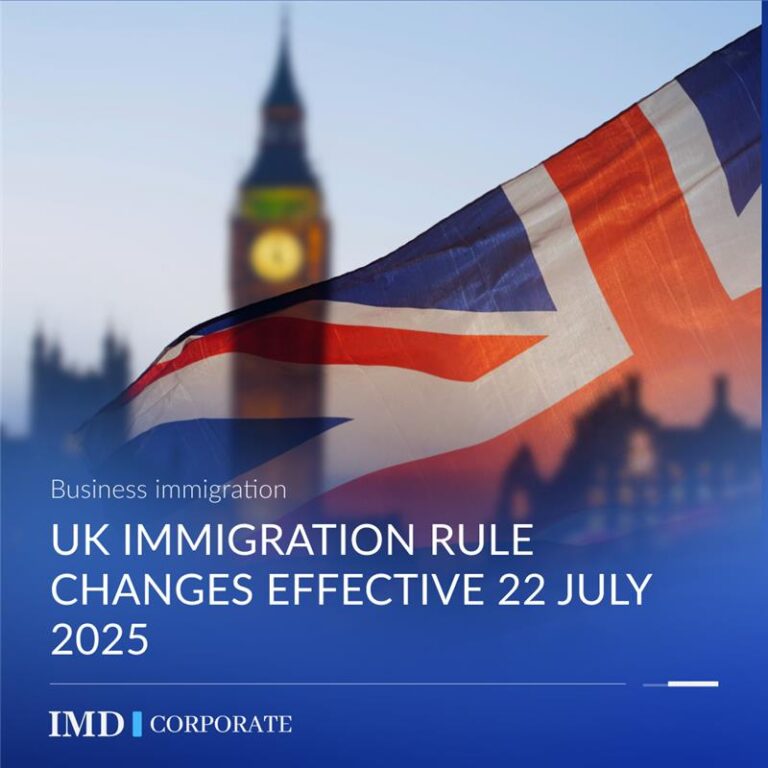UK Immigration Rule Changes Effective 22 July 2025
The UK government has announced a series of important updates to the Immigration Rules, which will take effect from 22 July 2025. These reforms are the first steps in implementing the government’s new immigration strategy, outlined in a recent white paper aimed at promoting economic growth, reducing net migration, and decreasing reliance on overseas labour.
The changes primarily impact the Skilled Worker route, and both sponsors and migrant workers will need to navigate the implications carefully. Below is a breakdown of the key reforms and how employers should respond to minimise disruption.
What is Changing, And How Employers Can Prepare
Higher Skill Requirements for Skilled Worker Visas
From 22 July 2025, jobs eligible under the Skilled Worker route must meet a higher skill threshold equivalent to a UK bachelor’s degree (RQF Level 6). This shift will disqualify many roles previously eligible for sponsorship and reduce the list of qualifying occupations by approximately 180 positions.
Employers may still assign Certificates of Sponsorship for roles that do not meet the new requirements, provided the application is submitted before 21 July 2025 or the applicant is already within the route before the new rules take effect.
Updated Salary Thresholds Across Work Visas
There will also be changes to salary requirements across several visa categories, including Skilled Worker, Global Business Mobility, and Scale-up routes. The general salary threshold for Skilled Worker visas will rise from £38,700 to £41,700 annually. Additionally, any applications for indefinite leave to remain under the Skilled Worker route submitted after 22 July must meet these new salary criteria.
Employer Action Plan
These changes reflect a broader policy shift toward attracting fewer but more skilled and better-paid migrant workers while encouraging businesses to invest in domestic talent. Sponsors must act promptly to remain compliant and avoid workforce disruption. Key recommended actions include:
- Submit visa applications early: Where feasible, issue new or renewal Certificates of Sponsorship before 22 July to be assessed under existing rules.
- Assess eligibility: Review job roles to ensure they meet the new degree-level (RQF Level 6) requirement.
- Revise salary offers: Update employment contracts and payroll systems to reflect the increased salary thresholds. Note that salary updates are not covered by transitional provisions.
- Prepare for transitional scenarios: Identify employees who may fall under transitional measures and ensure their visa status remains valid.
- Reassess workforce planning: With the updated Shortage Occupation List being temporary and more restrictive, shift focus toward domestic hiring and invest in training or reskilling UK-based staff.
- Keep your employees informed: Communicate the upcoming changes to existing sponsored workers so they understand how their status may be affected.
- Seek professional advice: The new rules come with tighter enforcement, making compliance more critical than ever. Legal guidance may be necessary to ensure your organisation remains within the rules.
Looking Ahead
The immigration white paper is part of a larger overhaul of the UK’s immigration and border control framework. Further updates expected later in 2025 include:
- A rise in the Immigration Skills Charge (ISC)
- Changes to English language proficiency requirements
- Introduction of a new framework for family visas
- Reducing Graduate Visa duration from 2 years to 18 months
- A possible extension of the settlement pathway under the Skilled Worker route from 5 to 10 years (not yet confirmed)
These developments signal a significant shift in how businesses can hire and retain global talent. Employers should take this opportunity to reevaluate recruitment strategies and prepare for a more selective and demanding sponsorship process. Proactive planning will be crucial to managing these changes effectively and ensuring continuity in hiring practices.
Contact Jarmila Entezari, Immigration lawyer for further assitance.

